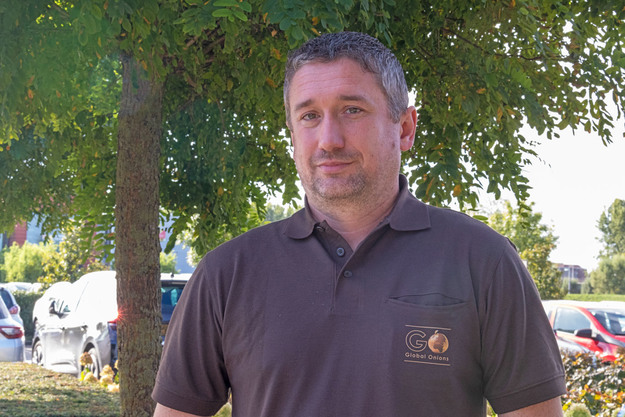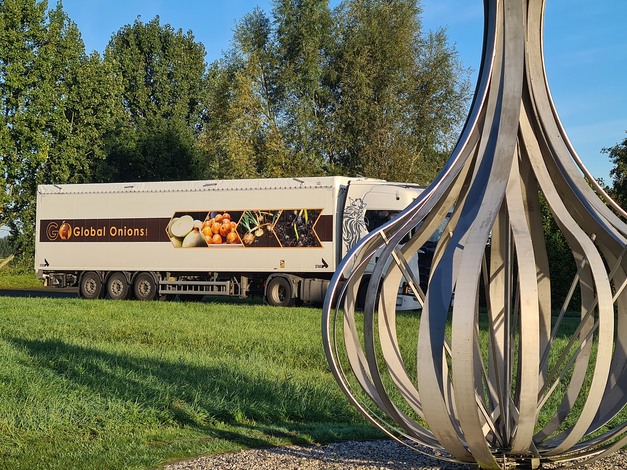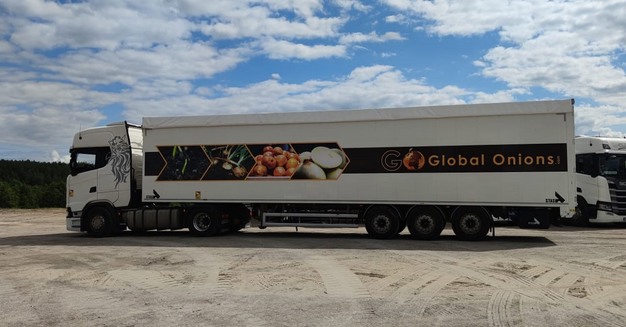The industrial onion market is growing. Convenience is becoming increasingly important in stores, restaurants, and greengrocers. Also, weather extremes are causing more and more crop failures, making it harder and harder to grow Class I onions. That benefits Mateusz Mackowski of Global Onions. The company focuses on trading onions that are not directly suitable for consumption. "Those are slightly defective or abnormally sized onions that people want to get rid of anyway. I've experienced extraordinary growth in the last 16 years," Mateusz begins.
 Mateusz Mackowski, Global Oninos
Mateusz Mackowski, Global Oninos
"I believe that rapid growth is primarily due to us wanting to evolve differently from most. We decided to create our own market. I traveled around Poland for a long time in the early years and visited all kinds of small peeling plants. I convinced them to invest or helped them invest in things like capacity expansion. They could, thus, grow and, thus, also process more onions. I could buy more and more onions from mainly Dutch growers and traders. But also increasingly more in Belgium, France, and Germany, and they could buy more and more. We could keep growing proportionally to each other. In 2013, it was even warned that a monopoly was developing in the industry trade."
Ever increasing supply
The trader works at the market's lower end, as he puts it. "We clear out everything that's not fit for consumption and bring it to the industry. That can range from too large to too small, or those with defects or quality issues. We have a wide range of customers. Though, that also complicates things because each has a machine that handles different types of onions. And, each client has different needs," says Mateusz.
"One needs small onions for salads or raw vegetables. Another wants them coarse for the freezer so each onion can yield more cubes. The next needs a certain size that works well for the breaded onion rings that lots of fast food restaurants use. It requires plenty of expertise and a huge amount of time, but I love it. I go to bed with it and get up with it. You learn with age, too. Just as well because the industrial onion market supply just keeps growing."
This year's onion set harvest was dramatic, which makes things extremely hectic for Mateusz. "Those genuinely flooded the market for a while, and prices between consumption and industry onions varied greatly. Those prices are, of course, always linked. If there are huge volumes of industrial onions and few consumption onions, one level is very low, the other, high," he says.

"It's not that if consumption onions becomes 10% pricier, industrial onions automatically do too. It remains its own market. The link lies mainly in the crops and, therefore, the supply's quality. Last year, for example, the quality was so good across the spectrum that we, too, had to buy good-quality onions for the industry just to get volumes. The two markets' prices were the same. That was unusual, but it shows how connected they are."
Own peeling plant
Yet, as with many types of vegetables, too much supply is, of course, not good for industry onions, either. "With the climate issues, I fear we'll have more and more crop failures, leaving more onions suitable for industry. It's already tough to grow Class I onions in the southern Netherlands; in southern Europe, it's becoming practically impossible. Production in countries like Germany and Denmark is, thus, increasing," says Mackowski.
He adds that surpluses mean you must sometimes wait for busier times, like around Christmas and Easter, to offer your onions. That is why, several years ago, Mateusz started a peeling plant in Poland. "Again, that was purely by chance. Sometimes, I find bargains here in Western Europe when a grader has plenty to get rid of immediately at a good price. Then, if my customers don't need product or aren't waiting for it because other origins are cheaper, I need somewhere to store all those onions. Thus, we started looking for a property to store these batches before marketing them. I'm well aware of seasonal fluctuations and know when demand picks back up."

"I use that know-how to fill gaps in the market with my stored stock in Poland. The warehouse was full after a mere month, and still, there was no demand for the onions. We had to think of something. I sat down with my brother-in-law, and together, we decided we should start peeling onions. He picked that up at the time. We installed machines and began. It was never planned; we didn't want to compete with our buyers. So, we decided to look for a market niche. We're the first Polish company to peel only organic for the export market, particularly back to the Netherlands or England. That's our specialization, and that's how we avoid stealing part of our customers' market," Mateusz concludes.
Mateusz Maćkowski
mateusz@globalonions.com  Global Onions
Global Onions
Irislaan 1
4401HX Yerseke
www.globalonions.com
go@globalonions.com
T: 0031 620677471
